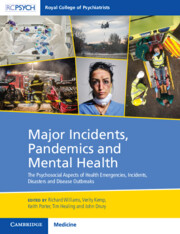 Major Incidents, Pandemics and Mental Health
Major Incidents, Pandemics and Mental Health from Section 5 - Sustaining and Caring for Staff During Emergencies
Published online by Cambridge University Press: 11 January 2024
This case study illustrates approaches to promoting the wellbeing of and initiating psychosocial care to support the mental health of the staff of public sector services in the UK. It focuses on staff who work in emergencies, including in the fire and rescue, police, ambulance, and search and rescue services, often referred to in the UK as the Blue Light services. This case study provides information illustrating what can be done to assist the work of employing organisations to promote the mental health of all employees – that is, senior, middle, junior, general, and professional managers and their staff. It describes important concepts in planning and in delivering interventions.
To save this book to your Kindle, first ensure [email protected] is added to your Approved Personal Document E-mail List under your Personal Document Settings on the Manage Your Content and Devices page of your Amazon account. Then enter the ‘name’ part of your Kindle email address below. Find out more about saving to your Kindle.
Note you can select to save to either the @free.kindle.com or @kindle.com variations. ‘@free.kindle.com’ emails are free but can only be saved to your device when it is connected to wi-fi. ‘@kindle.com’ emails can be delivered even when you are not connected to wi-fi, but note that service fees apply.
Find out more about the Kindle Personal Document Service.
To save content items to your account, please confirm that you agree to abide by our usage policies. If this is the first time you use this feature, you will be asked to authorise Cambridge Core to connect with your account. Find out more about saving content to Dropbox.
To save content items to your account, please confirm that you agree to abide by our usage policies. If this is the first time you use this feature, you will be asked to authorise Cambridge Core to connect with your account. Find out more about saving content to Google Drive.